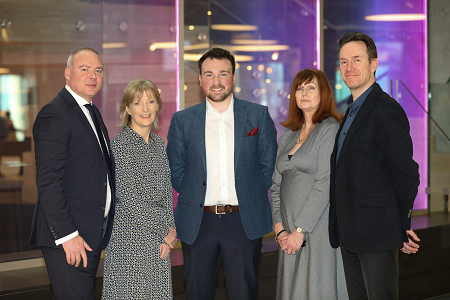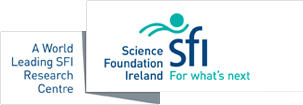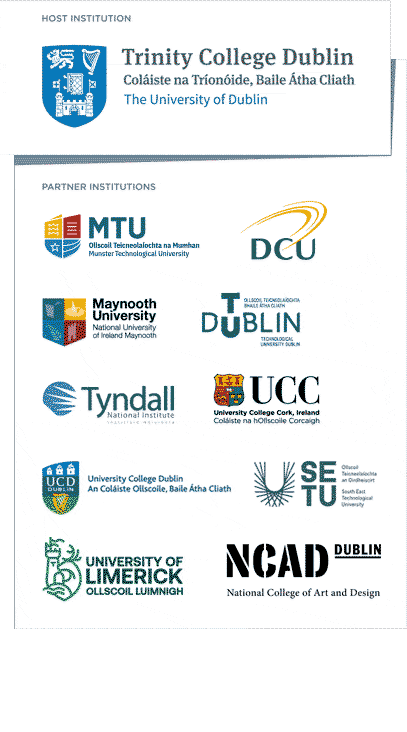The recently launched Smart Sandyford programme is a partnership between Dun-Laoghaire Rathdown County Council, the ENABLE research programme, the Sandyford Business Improvement District, and Smart Dublin.
Conor Mark Dowling is the programme manager, and tells us more…
Smart Sandyford launched recently: what’s it all about?
The Smart Sandyford programme will address some of the largest challenges facing cities today from transport to climate change. We work directly with local companies and residents to test real-world solutions. Successful solutions can then be scaled across Dublin.
We have conducted workshops with residents and local businesses and identified priority challenges. Projects are now being developed to address these. The primary focus of these projects is around sustainable mobility, which involves the development of technologies to facilitate commuters using public transport and other sustainable transport modes (WeMove). Current Smart Sandyford projects including the use of European Space Agency satellites to monitor the quantity and quality of accessibility parking spaces in the district (Access Earth). Climate monitoring is also underway.
What excites you about it?
The sheer variety of projects and the immediate impact that they will have as part of this real-world test bed. We have monthly taskforce meetings with local tech companies so we have constant communication and feedback from them. This means that projects can be reviewed and improved to meet the needs of the target audience on an ongoing basis.
At this early stage, what looks promising?
The high density of people working and living in the district (30,000 in an area of just 2km2) makes it an ideal location to test technology that would not be possible elsewhere. Sandyford is also home to some of the leading tech and telecom companies in Ireland including Microsoft, Google, Facebook, Mastercard, Vodafone, Huawei and Cellnex to name a few. Working with these companies is already leading to exciting new opportunities, collaborations and projects around IoT.
What challenges are emerging?
We launched Smart Sandyford on 27 February. The following day Ireland announced its first case of Covid-19. While this has been challenging it has also been rewarding to be able to facilitate projects that make a big difference in the local area at this challenging time. We are working with Moby bikes, for instance, to provide e-bikes for frontline medical staff including the council fleet of mobility hub e-bikes. We connected the engineering department in UCD with the Beacon Hospital to provide necessary PPE, and we are working with an international network of academic researchers who are analysing the response of government at all levels from around the world to the virus.
Three years from now, what will be different in Sandyford because of this initiative?
We hope to make Sandyford a truly smart place to live and work. Our primary aim is to have a measurable impact on the volume of traffic in the area. To start this will be achieved by gathering data and baseline information on the current conditions in the area. From there, projects can be selected and deployed to meet local needs. Over time, the impacts of these projects will be measurable through the data.
In the long term our approach to smart cities will benefit Sandyford through data driven decision making, leading to improved transportation, enhanced citizen-Council interaction, an enhanced internet and telecoms networks, and more efficient public utilities.

At the launch of Smart Sandyford, Conor Battigan, Siobhán Clarke, Conor Dowling, Therese Langan, Alan Murphy
Do you have any message for academics interested in getting involved?
Smart Sandyford offers access to a vast network of potential collaborators in the CONNECT Centre and the ENABLE research programme. We are also currently involved with an international network of researchers from Japan, China, EU and USA working to analyse the responses of governments to Covid-19.
Our projects are leading to the production of a wealth of data: from air quality through to commuting patterns and systems structures. We need help from data scientists to analyse and make sense of this data to help paint a bigger picture.
Any message for industry partners interested in learning more?
Working with Smart Sandyford offers companies an excellent opportunity to test, prove and promote their projects and solutions. We are working with a number of companies in the area to showcase new technologies that will enhance the district for everyone living and working there.
And what about you: what’s your background?
Over the last four years I have been working on my PhD in the area of Urban Resilience in the School of Business in Trinity College Dublin. I designed a resilience management framework which was tested through a case study looking at flooding in Dublin. As part of this research I worked with Smart Dublin and Dublin City Council to deploy a network of Sigfox IoT river-level sensors around the city.
What attracted you to working on this project?
I grew up beside Sandyford and have watched it develop from a busy industrial estate to the modern business district it is today. The development of the M50 and Green line Luas have been transformative but there are a number of challenges facing the district that I believe smart solutions can answer.
Having worked with the Smart Dublin team during my earlier research I jumped at the opportunity to get further involved as programme manager for the Smart Sandyford project.
What does the future hold for smart city developments?
Smart cities are already here and, on the positive side, they allow us to analyse mass quantities of data which will enable Irish cities to become more efficient and sustainable. However there is a fine line. There are ethical issues such as who owns the data, who this technology should serve, and to what extent citizens should be monitored. For this reason we work to make all our data publicly available and have strict ethics procedures for each and every project. In the future I see these types of ethical questions becoming more prevalent.
Contact: If you would like to find out more or get involved in Smart Sandyford email Conor – conor.dowling@smartsandyford.ie

CONNECT is the world leading Science Foundation Ireland Research Centre for Future Networks and Communications. CONNECT is funded under the Science Foundation Ireland Research Centres Programme and is co-funded under the European Regional Development Fund. We engage with over 35 companies including large multinationals, SMEs and start-ups. CONNECT brings together world-class expertise from ten Irish academic institutes to create a one-stop-shop for telecommunications research, development and innovation.
In Focus


